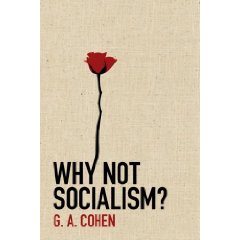The stupidest decision I made as an undergraduate was not to go to Jerry Cohen’s lectures on Marxism. The London colleges, despite being almost completely separate, pooled resources to give Philosophy lecture courses for 2nd and 3rd years. The lectures were held in tiny lecture rooms at Birkbeck – I seem to remember usually being there on Tuesday and Thursday mornings. The relevant term, Jerry’s lectures were on the same morning as the philosophy of language and philosophy of mind courses; I knew that I only had the concentration for 2, and, despite being, I presumed, some sort of Marxist (unaffiliated), I had no interest in political philosophy (not least because I believed some quite unsubtle version of Marx’s theory of history). (I’ll also admit that I responded somewhat to peer-pressure; my mate Adrian was not going to the Marxism lectures, and it was fun to have coffee with him instead). Like, as I later found out, Jerry, I had not come to study philosophy in order to learn about political ideas – I’d been politically active since I was 15 and had been exposed to all the political ideas that implied while I was in secondary school (taught History by a member of the CPB (M-L); indirectly recruited to the peace movement by a former CPGBer; worked with someone in the NCP, various SWPers; engaged in conspiratorial faction fights within the peace movement against various Trotskyists including CB’s flatmate of that time… you get the idea). I went to university to study something that I knew I couldn’t learn any other way – analytical philosophy. So it was easy to pass up Jerry’s lectures, even though everyone said they were brilliant, and even though I was interested in Marxism.
Later Jerry influenced me enormously. I bought Karl Marx’s Theory of History A Defence
as a celebration of getting my degree and read it first on a trip after graduating; I studied it about half-way through graduate school (along with these papers by Levine and Wright, and Levine and Sober), and more than anything else was responsible for my shift away from philosophy of language to political philosophy; because, like most readers of KMTH, I became convinced that the version of Marx’s theory of history that had seemed to me to make political philosophy irrelevant was false. I then read what is still my favourite Jerry paper, “The Structure of Proletarian Unfreedom”, and subsequently saw him lecture at UCLA; from then on I guess I read nearly everything he published, as soon as I could get my hands on it.

So now, what I presume is his final book, Why Not Socialism? (UK
) (I hope there’ll be other publications – presumably someone, probably one of our readers, is taking responsibility for seeing some of the work that Jerry left unpublished into print) is in my hands. Princeton have deliberately created it to be like On Bullshit
– very short, beautifully made, small enough to fit in a smallish pocket. People have been calling it the “camping trip” book; he uses the conceit of a camping trip to demonstrate that organizing social life around the two principles that, for him, define socialism – a very stringent version of equality of opportunity, and a very demanding principle of community – is very appealing to most people in some circumstances. He goes on to demonstrate that the appeal of these principles is not superficial, or restricted to unusual circumstances such as a camping trip, but are appealing at a society-wide level too: